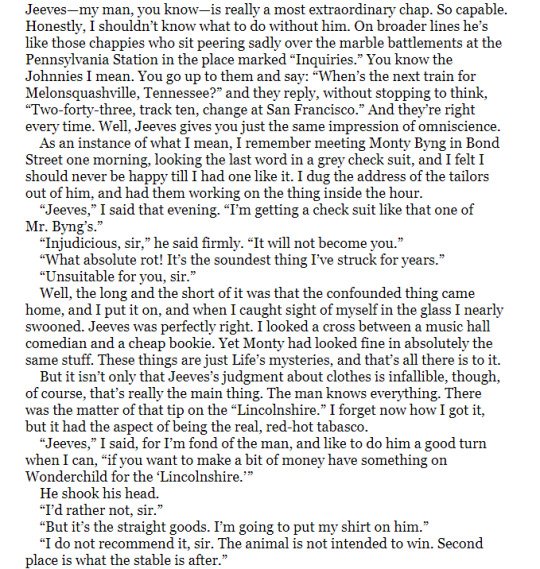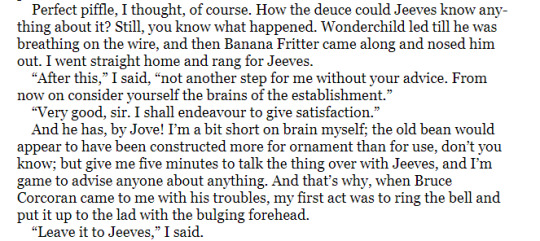#sorry to suddenly post this diatribe on the lrj blog
Explore tagged Tumblr posts
Text
My Man Jeeves vs. Carry On, Jeeves: A Choice On the Basis of Charm
So as I was having a go at putting the letters together with Mr. Wooster, I realized that the versions of the early New York saga on Standard eBooks, where I sourced the text, were taken from the 1919 collection My Man Jeeves, rather than Carry On, Jeeves - the latter being how I presume the majority of fans read the stories. Naturally, I figured that I really ought to get the most recent public domain versions of the stories, to best represent the current nature of the series. So I had a look at Carry On, Jeeves, curious about the differences therein. And the ones I found were... kind of disappointing.
So, if you haven't read the stories, or just aren't bally interested, then I'll just say that I think the versions present in My Man Jeeves are an awful lot more fun than their rewrites, and am making the executive decision as Woosterian Substack Secretary to use the old instead of the new. For those who are bally interested, I'll chat a bit more under the cut.
All in all, the differences aren't extreme. None of the plot elements have changed, most of the lines haven't changed, and really, if you know one version of the story, you won't have trouble conversing with someone who knows the other. But I find the changes made in the nature of baffling. Some are very tiny changes, but odd nonetheless. Here's Bicky in "Hard-Boiled Egg", talking about why he doesn't want to go in for ranching, in the original My Man Jeeves.

And here's the same passage in Carry On, Jeeves.

Why cut the line about Bicky hating horses because they bite? It gives a more interesting context to why he doesn't want to ranch than the one in Carry On, Jeeves. He doesn't just not want to do the work out of laziness - he's afraid of horses! It's an unexpected and interesting thing for him to say, and it builds a sort of unique speech pattern of short, snappy sentences that fire one after another. It's such a tiny thing that I'm not even sure why it was deemed necessary to cut, unless there were length requirements, but it sands Bicky down a bit.
However, some of the other changes are much more considerable. Take the intro to "The Aunt and the Sluggard" in My Man Jeeves...

...and compare it to the intro in Carry On, Jeeves.

Not even close! What possessed anyone - Wodehouse or editors - to make this sort of cut? On some level I suppose I could understand it if it were purely for the sake of not needing to introduce the character partway through a book, when you'd certainly need to in a magazine, but clearly My Man Jeeves didn't see a problem with having Bertie repeatedly introduce Jeeves this way - and as a reader, neither did I! It's a very charming paragraph full of Bertieisms, and the nervous sort of hesitation upon wishing to call him a friend is even more endearing. Sure, the "guide, philosopher, and friend" quote is later used in the first chapter of 1923's The Inimitable Jeeves, so I can see why Wodehouse and/or editors might have thought the sentiment too repetitive to stick in a collection published afterwards, but the two are subtly different. Here, Bertie is unsure that he can call Jeeves a friend, but in The Inimitable Jeeves below, he says it with surety.

It's especially sweet with the knowledge that My Man Jeeves was published before The Inimitable Jeeves, because that shows this as growth! He's more willing to let himself acknowledge their friendship, and that's a wonderful thing! And even without that linearity, it's just so much weaker of a start. You aren't as drawn in by the significant blander intro as you are by the acquainted birds of poet Johnnies, or the "guide, don't you know" that Bertie relies on at every turn. It's more conversational, engaging, and just plain fun.
But that's not even really the most egregious removal. No, the biggest difference is the excising of the entire intro to "Leave It to Jeeves".


This whole section, which later segues into a sum-up of the events of "Extricating Young Gussie" and a description of New York, is just plain gone in "The Artistic Career of Corky", which this story has been renamed in Carry On, Jeeves. No "Melonsquashville, Tennesee", no horses named Banana Fritter, no Bertie trying to give Jeeves racing tips because he's fond of him. It's peak Bertie silliness, and I remember that I really loved reading it. And yes, again, maybe it was cut just because it follows "Jeeves Takes Charge", which already introduces the character, but I certainly don't see a reason why none of it could be kept - especially since the conceit of the series tends to read as if being told aloud to someone else, and thus it makes sense to repeatedly introduce the character in such a way to new listeners and audiences. Instead, we are given this by way of introduction.

This goes straight into the "Gussie" sum-up and the description of New York, as well as the subsequent description of Corky. All that fun before, reduced to a paltry bit of introductory exposition before the exposition that already happened in the original. Was it cut merely for length? Why else could this possibly have happened? Why remove all that delightful humor and prose in favor of something so much weaker and less interesting? It boggles the mind - boggles it.
In short, I've decided to keep the My Man Jeeves versions of these stories as they are. While some of the changes I saw weren't bad - saying that Rocky's poem went on for "three more verses" got a chuckle out of me, I will say, and the connective tissue with the other stories wasn't bad, either - it was not enough to sacrifice all this. Bertie's narration is always a delight, and I think that delight should be preserved. But if anyone has rebuttals as to why they think the Carry On, Jeeves versions should be used instead, I'd honestly love to hear them!
Thank you for reading!
#letters regarding jeeves#lrj#jeeves and wooster#bertie wooster#reginald jeeves#francis bickersteth#rockmetteller todd#sorry to suddenly post this diatribe on the lrj blog#but i think it's important for readers to know!#i didn't know i was reading the My Man Jeeves versions because Standard eBooks said it used the most recent versions in public domain#which in this case was not actually true#but I have... neglected to tell them to change it#perhaps it is bad faith of me#but if other people are 'tricked' like me into reading the more charming versions of the stories#i don't think that's such a bad thing
127 notes
·
View notes